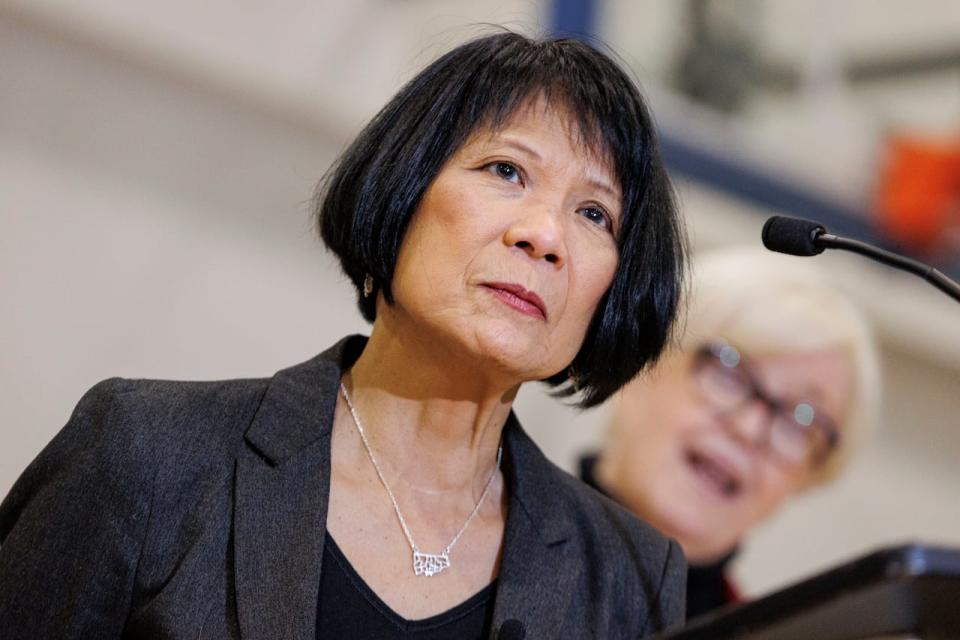Toronto mayor's executive committee endorses 10% speculation tax on foreign home buyers

Toronto Mayor Olivia Chow's executive committee voted Tuesday in favour of creating a new municipal tax on foreign home buyers who purchase property in Toronto.
If approved by the full council next month, the "municipal non-resident speculation tax" (MNRST) would make foreign nationals pay an additional 10 per cent on the purchase price of residential properties starting in January 2025.
The city staff recommendation sailed through the committee by a show of hands.
"It's an issue that's been well-debated by other levels of government and the executive committee members today endorsed it without much debate because it's been talked about for quite a few years," Chow told reporters outside the meeting.
"It's a change that we should have made before. I'm glad that we are doing so."
The tax is meant to discourage international buyers from purchasing homes in Toronto in order to protect housing supply and to maintain affordability, according to a city staff report, particularly among speculative investors and those who don't plan to live in the properties they purchase.
It's the latest move councillors hope will address Toronto's housing supply and affordability crisis.
Chow said while data from other governments show speculation taxes "somewhat" work, she admitted foreign buyers are responsible for only a "slight" contribution to the housing crisis.
"We have a housing crisis of supply and because we have not built housing, affordable housing, rent-geared-to-income housing for people for several decades."
Municipal tax to 'mirror' provincial tax
Toronto's tax was designed to "mirror" the Ontario government's non-resident speculation tax, the staff report says. The provincial tax was introduced in 2017 at a rate of 15 per cent and initially only covered purchases in the Greater Golden Horseshoe area of southern Ontario, but it has since been expanded to the entire province and raised to 25 per cent.
The province collected more than $1 billion for its tax between 2017 and 2022, approximately half of which came from purchases in Toronto, according to the report. Data for 2023 is still being finalized, but staff expect it to be down due to the impact of a two-year federal ban barring most foreign buyers from purchasing residential property.

Chow says while data shows speculation taxes are 'somewhat' effective, she admitted foreign buyers have only slightly contributed to Toronto's housing affordability and supply crisis. (Evan Mitsui/CBC)
When charged on top of existing municipal and provincial land transfer taxes, city staff expect the tax to deter speculative real estate purchases, and where it doesn't, to contribute to the city's budget.
Staff estimate the tax could bring in between $14 million to $15 million in revenue in 2025, according to the report. However, that estimate is based on a scenario where the federal government lifts the foreign buyer ban. If the ban is extended, staff say it would bring in up to $9.6 million.
The tax would cover land purchases of up to six "family residences," which includes detached homes, semi-detached homes, townhouses and condos, according to the report. It won't cover purchases of multi-residential apartment buildings with more than six units, agricultural land, commercial land or industrial land.
The municipal tax will apply to foreign nationals and foreign-controlled companies, with exemptions for people who are nominated under Ontario's immigrant nominee program and protected persons, including refugees.
Foreign nationals who purchase homes jointly with a spouse who is a Canadian citizen, permanent resident, nominee or protected person will also be exempted from the tax.
Council will consider the speculation tax at its next meeting scheduled to take place from Feb. 6 to 8. If passed, the tax would take effect Jan. 1, 2025, after the temporary foreign buyer ban expires.


